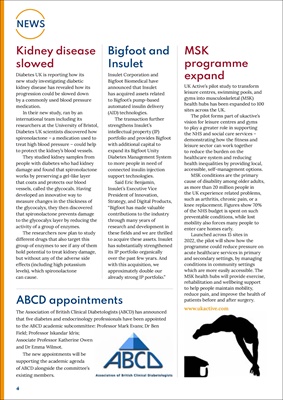
4
NEWS
Kidney disease
slowed
Diabetes UK is reporting how its
new study investigating diabetic
kidney disease has revealed how its
progression could be slowed down
by a commonly used blood pressure
medication.
In their new study, ran by an
international team including its
researchers at the University of Bristol,
Diabetes UK scientists discovered how
spironolactone - a medication used to
treat high blood pressure - could help
to protect the kidney's blood vessels.
They studied kidney samples from
people with diabetes who had kidney
damage and found that spironolactone
works by preserving a gel-like layer
that coats and protects our blood
vessels, called the glycocalx. Having
developed an innovative way to
measure changes in the thickness of
the glycocalyx, they then discovered
that spironolactone prevents damage
to the glycocalyx layer by reducing the
activity of a group of enzymes.
The researchers now plan to study
different drugs that also target this
group of enzymes to see if any of them
hold potential to treat kidney damage,
but without any of the adverse side
effects (including high potassium
levels), which spironolactone
can cause.
Bigfoot and
Insulet
Insulet Corporation and
Bigfoot Biomedical have
announced that Insulet
has acquired assets related
to Bigfoot's pump-based
automated insulin delivery
(AID) technologies.
The transaction further
strengthens Insulet's
intellectual property (IP)
portfolio and provides Bigfoot
with additional capital to
expand its Bigfoot Unity
Diabetes Management System
to more people in need of
connected insulin injection
support technologies.
Said Eric Benjamin,
Insulet's Executive Vice
President of Innovation,
Strategy, and Digital Products,
"Bigfoot has made valuable
contributions to the industry
through many years of
research and development in
these fields and we are thrilled
to acquire these assets. Insulet
has substantially strengthened
its IP portfolio organically
over the past few years. And
with this acquisition, we
approximately double our
already strong IP portfolio."
MSK
programme
expand
UK Active's pilot study to transform
leisure centres, swimming pools, and
gyms into musculoskeletal (MSK)
health hubs has been expanded to 100
sites across the UK.
The pilot forms part of ukactive's
vision for leisure centres and gyms
to play a greater role in supporting
the NHS and social care services -
demonstrating how the fitness and
leisure sector can work together
to reduce the burden on the
healthcare system and reducing
health inequalities by providing local,
accessible, self-management options.
MSK conditions are the primary
cause of disability among older adults,
as more than 20 million people in
the UK experience related problems,
such as arthritis, chronic pain, or a
knee replacement. Figures show 70%
of the NHS budget is spent on such
preventable conditions, while lost
mobility also forces many people to
enter care homes early.
Launched across 15 sites in
2022, the pilot will show how the
programme could reduce pressure on
acute healthcare services in primary
and secondary settings, by managing
conditions in community settings
which are more easily accessible. The
MSK health hubs will provide exercise,
rehabilitation and wellbeing support
to help people maintain mobility,
reduce pain, and improve the health of
patients before and after surgery.
www.ukactive.com
ABCD appointments
The Association of British Clinical Diabetologists (ABCD) has announced
that five diabetes and endocrinology professionals have been appointed
to the ABCD academic subcommittee: Professor Mark Evans; Dr Ben
Field; Professor Iskandar Idris;
Associate Professor Katherine Owen
and Dr Emma Wilmot.
The new appointments will be
supporting the academic agenda
of ABCD alongside the committee's
existing members.